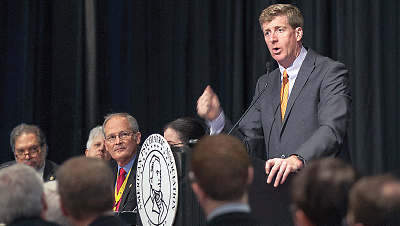Parity Law Just One Stop on Long Journey, Kennedy Says
Abstract
The parity law’s chief architect says that psychiatrists can help determine how the law changes the state of mental health care in this country.

Patrick Kennedy tells Assembly members that the battle against mental illness discrimination “is part of the march toward progress embodied in the civil-rights movement in our country and in the historical human-rights movement that occurred in South Africa.”
The long-awaited final rule on implementing the federal mental health parity law was issued last month, “but the final word on mental health is not yet written.” That was a point emphasized by the law’s chief sponsor, former member of Congress Patrick Kennedy, during a speech last month to the APA Assembly in Washington, D.C.
To what extent the parity law changes the lives of people with mental illness for the better will in large part have to be determined by psychiatrists “on the front lines,” who battle to make mental health care as routine as the rest of medical care, he told Assembly members.
Kennedy lamented the stubborn stigma that still attaches to mental illness as well as the thousands of suicide deaths that could be prevented every year if people weren’t ashamed of having an illness affecting the brain rather than other organs of the body. With the implementation of the parity law, the brain is “no longer left out of medicine,” he said.
He added that in the battle against stigma, it is appropriate to adopt the slogan that AIDS activists used in their fight against a highly stigmatized illness a couple of decades ago: “Silence = Death.”
Kennedy, who fought for 12 years to get the mental health parity law passed, said that the battle against mental illness discrimination “is part of the march toward progress embodied in the civil-rights movement in our country and in the historic human-rights movement that occurred in South Africa.” (The government of South Africa, he noted, bestowed its highest civilian honor on his father, the late Sen. Edward Kennedy, for his support in the antiapartheid movement including imposition of U.S. sanctions against the South African government.)
“What you’re fighting for at APA,” he declared, “is giving a connection to human beings who feel marginalized because their illness is so shamed and stigmatized, much like Americans who are marginalized because of the color of their skin, their gender, their sexual orientation, or their religious ethnicity.”
He also described the long journey from the parity bill’s introduction in Congress to its passage in 2008 and the issuance of a final rule to implement it last month. He cited in particular his disappointment with several congressional colleagues who took him aside to reveal how mental illness had affected them or a family member but then voted against the bill, afraid about voter reaction. “The biggest enemy we have is secrecy,” he stated.
He ended by describing how receiving mental health treatment changed his life for the better, allowing him to experience the joy of seeing the parity law enacted, its final rule issued, and of being a father able to give his children the foundation in life that all children need. Kennedy now serves as a senior advisor to APA. ■
Listen to Kennedy’s remarks to the Assembly at http://www.psychiatry.org/advocacy--newsroom/newsroom/video-news/patrick-kennedy-2013.



